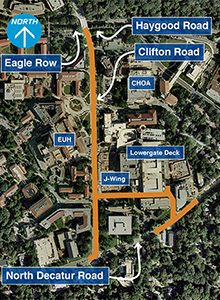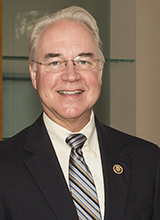

Legislative round-up 2016 |

Early results: care model for seniors |

Microbe watch |
 In brief |
|||||
| May 23, 2016 | |||||||||||||||||
Clifton Streetscape will improve access, enhance aesthetics
Clifton Streetscape, a project to improve access, safety, and aesthetics along Clifton Road, is slated to begin next month (exact start date to be announced). Starting at Haygood Drive/Eagle Row and extending to North Decatur Road, it will include widening of the road and sidewalks, repaving of Clifton Road, new landscaping, and new access points to the Clifton corridor. The project will take approximately a year to complete and coincides with the opening of the J wing of Emory University Hospital (EUH).
Some specifics: An almost half-mile segment of Clifton Road will be resurfaced and widened, and a bike lane will be added along the east side—a "sharrow" or shared bike-vehicular lane will remain on the west side of Clifton Road. Sidewalks will be widened to eight feet, with addition of a five-foot planted strip along the curb, and trees and other plantings will be added to new medians. Street lights similar to those at Emory Village and Emory Point will be installed as well. A new right-turn lane will be added at Clifton and North Decatur roads for westbound traffic headed toward Emory Village. A new traffic light and ingress/egress lanes also will be added at Healthgate Drive and North Decatur (currently a gated, limited access entry near the North Decatur Building). This access point will be for use primarily by Emory/Emory Healthcare faculty and staff who are accessing the parking decks along Gambrell Drive and is not intended for patients or through traffic. These and other changes will help "calm traffic; improve safety for pedestrians, bikers, and drivers; and generally improve traffic flow for all those who travel Clifton Road each day," says Al Herzog, senior program manager for Campus Services. He adds that Clifton Streetscape is consistent with urban design guidelines developed with Emory several years ago by the Boston-based urban design firm, Goody Clancy, to provide a framework for more vibrant public areas on Clifton Road. Clifton Streetscape is being handled by JE Dunn Construction. Separate but concurrent project affecting traffic: As part of the construction of the EUH J wing, a new pedestrian bridge is planned for installation over Clifton Road from the new J wing to EUH, starting in July. Later, the existing bridge will be removed. Bridge installation, being done by Gay Construction, will take place over a weekend and will necessitate restricted access to a portion of Clifton Road for that weekend. During that time, general traffic will be rerouted around the work site, and ambulances and emergency room visits will be accommodated. Patience needed and appreciated: Both the bridge and Clifton Streetscape work will necessitate extended, periodic lane closures, although much of the road regrading and resurfacing work will be done at night and on weekends. An Emory team is dedicated to keeping the Emory community, patients, visitors, and neighbors apprised of the work schedule and lane closures to minimize impact on travel and appointment times, says Herzog. Regular updates will appear in this publication and in Emory Report, and the CliftonStreetscape.com website will serve as an ongoing schedule resource.
The Governor recently completed review of legislation passed during the 2016 Legislative Session. He vetoed 16 measures, including the religious liberty and campus carry legislation. While these dominated headlines, a number of less publicized health care bills of interest to Emory were considered this year: HIV researchers were impacted by legislation clarifying existing law to allow minors to be tested for HIV without parental consent. This will allow researchers to gather critical data on the spread of HIV within this population. Despite attempts to weaken the state's certificate of need (CON) process, the program remains unchanged. An effort to repeal the CON program lost steam early in the session. Legislative leaders are expected, however, to convene a working group in the months ahead to take a close look at the program. The Office of Government and Community Affairs (OGCA) will continue to closely monitor any CON-related activity and will coordinate with relevant business owners and legal staff. In the months leading up to the session's start in January, the OGCA team began preparing for a state legislative response to fetal tissue research. A bill to prohibit the purchase or sale of fetal tissue in Georgia was introduced, and OGCA worked with Emory medical and legal representatives and external allies to ensure that the language drafted did not in any way impede Emory's research. The bill eventually stalled in the Senate Rules Committee. In response to the backlog of rape kits found in some metro Atlanta hospitals, legislation was passed to establish uniform standards for the transfer of forensic medical exams from hospitals and rape crisis centers to law enforcement agencies. The bill requires law enforcement to pick up all rape kits within 96 hours from hospital and rape crisis centers, and those kits must be processed by law enforcement within 30 days. Some provisions of the underlying bill remain unclear with regard to administration of the new requirements. Legislation is expected to be introduced next year to clarify the law. It was a relatively good budget year for health care. More than 30 primary care and Ob-Gyn codes will move to the Medicare rate in the FY 2017 budget, which takes effect July 1. See OGCA's complete 2016 Implementation Report.
Federal overview: On May 4, EVPHA Jon Lewin met with U.S. Rep. Tom Price (R-GA), Chairman of the U.S. House Budget Committee. President Wagner was also in the meeting. The conversation included discussion about economic modeling to reinforce the concept that research funding is beneficial to Georgia's economy. Following the meeting, Congressman Price spoke to a town hall meeting organized by the Emory Science Advocacy Network, a graduate student group that seeks to promote biomedical research funding through advocacy and education. With floor time limited this year, congressional leaders are already looking ahead to 2017 and believe action could occur on entitlement reform and the Affordable Care Act next year. Still, there is a chance for passing bipartisan legislation this year on funding to combat the Zika virus, addressing opioid abuse, improving behavioral health services, and spurring medical innovation. Emory continues to advocate for increased research funding, reducing the administrative burden experienced by research institutions, flexible regulations for off-campus hospital outpatient departments, and the SMARTER Act, which would standardize hospital merger reviews between federal antitrust agencies. Early results: care model for Medicare Advantage patients
An article published in the April 28 issue of NEJM Catalyst, outlines experiences thus far of a collaboration between Emory Healthcare and CareMore Health System to provide a population-based payment model for seniors. As described in "One Path to Value-Based Care for Academic Health Systems," more than 13,500 older adult patients have enrolled in the coordinated care Emory Healthcare Network Advantage program. The network currently includes members from three insurance companies. Two Emory Coordinated Care Centers opened in 2015 and are available to Emory’s Medicare Advantage patients who have an Emory primary care physician. The centers provide health care solutions for the complex problems of aging. The article is co-authored by former and current EVPHAs Michael Johns and Jon Lewin with CareMore president, Sachin Jain. According to Lewin, the population-based model, which entails risk-adjusted prepayment for provider services and 100% shared risk between providers and payers, was designed to focus on patients who have or are at risk for chronic conditions such as diabetes, congestive heart failure, or lung disease. Early results from the collaboration have shown the following: - Primary care capacity has increased because primary care physician (PCP) practices have fewer administrative responsibilities and thus more time for patients' acute care visits. The authors also discuss challenges they have encountered in launching the program, including acquiring sales and marketing expertise and acquainting providers with a model different from fee-for-service. Read more. Microbe watch
Measuring microbiome disruption: In a recent article in American Journal of Infection Control, infectious disease specialist Colleen Kraft and colleagues from Emory and CDC discuss the need for a microbiome disruption index to inform decisions on antibiotic stewardship and interventions such as fecal microbial transplant or oral probiotic capsules. They say that measures of microbiome diversity should assess several factors: - Overall diversity: how much does one type of bacteria dominate - Presence of bad guys, like C diff - Presence of "keystone" species that prevent takeover by the bad guys - Presence of bacteria thought to be beneficial or protective. Read more in Lab Land blog. Heteroresistant bacteria: In a recent article in Nature Microbiology, scientists led by David Weiss, who leads the Emory Antibiotic Resistance Center, discuss strains of Enterobacter cloacae that are heteroresistant to the "last resort" antibiotic colistin. E cloacae has been causing an increasing number of infections in hospitals around the world. Through heteroresistance, a subpopulation of antibiotic-resistant bacteria can lurk within a genetically identical crowd of antibiotic-susceptible bacteria. The phenomenon could be causing unexplained treatment failures in the clinic and highlights the need for more sensitive diagnostic tests. The colistin-heteroresistant bacteria were isolated from blood or urine samples from patients at Atlanta hospitals. "We are working on more sensitive diagnostic techniques, which would be required to catch strains like this in the clinic,” Weiss says. Infectious disease experts were concerned about a November 2015 report from China of colistin resistance in another type of bacteria (Escherichia coli), because in that case, resistance was carried on a mobile piece of DNA, known as a plasmid, which can spread to other bacteria. Read more. |
| From the Executive VP
Congratulatons to new graduates
This month I had the privilege of participating in a tremendously joyful and inspiring occasion—Emory’s commencement ceremonies and activities. From the beautiful setting and weather to the high degree of precision planning involved, the day was an outstanding celebration of our graduates' passion, hard work, and achievement. It was an honor to share that moment with our graduates and their proud families, and was a great reminder of one of the important ways we make a real difference in people's lives. As our graduates across all the health professions prepare to leave Emory, it is my hope not only that they are prepared to be the most skilled and highly trained practitioners, but also the most honest, kind, respectful, and empathetic. Our students in medicine, allied health, nursing, and public health share a commitment to saving and improving the lives of people here in Georgia and around the world. I trust that they also share an appreciation for what a profound honor and an awesome responsibility it is to serve people in need. Best wishes to our class of 2016. I'm excited about all that you will accomplish in the years ahead! Please direct questions and comments to evphafeedback@emory.edu.
New online degrees in nursing
The nursing school will begin offering full- and part-time executive online versions of courses for Master of Science in Nursing degrees in several acute care specializations, including neonatal nurse practitioner (NP), adult-gerontology NP, and pediatric NP. Enrollment is now open for the online neonatal program, which starts this fall. Enrollment for the latter two online programs will open July 15, 2016, for the fall 2017 semester. Read more. Winning image
Congratulations to postdocs whose images took top spots in the Office of Postdoctoral Education's 2016 Best Image Competition. View the top 10 entries. Notable
Walter J. Curran Jr, Winship executive director, received a gold medal from the American College of Radiology (ACR) Board of Chancellors for contributions to the ACR and radiology discipline. Read more.
At commencement exercises earlier this month, the following faculty received awards: Medicine: Stacy Higgins received the Evangeline Papageorge Teaching Award. James Zaidan received the Emory Williams Teaching Award. Nursing: Kate Yaeger received the Emory Williams Teaching Award. Public Health: Carol Hogue received the Emory Williams Teaching Award. Michelle Kegler received the Thomas Sellers Award. Lauren Christiansen-Lindquist was name Faculty of the Year.
L to r above: Eugene Huang, Limin Peng, and Qi Long, Rollins faculty in biostatistics and bioinformatics, were named fellows of the American Statistical Association.
Wendy Armstrong, director of the Ponce Infectious Disease Center at Grady, and William Woods, former director of Aflac Cancer & Blood Disorders Center at Children's Healthcare, are Physician and Lifetime Achievement award recipients in the 2016 Atlanta Business Chronicle's Healthcare Heroes competition. Amy Langston (Winship) and Nitika Gupta (director of Children's Adolescent Transplant Program) were finalists for Physician. David Weiss (infectious diseases) was finalist for Rising Star. The TAVR team (Vinod Thourani, Robert Guyton, Vasilis Babaliaros, and Peter Block) was a finalist in Innovation. And Judith Wold and Lisa Muirhead (both in nursing) were finalists in Community Outreach and Allied Health, respectively. Read more.
Sheila Sanders is the new interim chief information officer for Emory Healthcare. Tanya Cossett, who has served in this role since early April, will now serve as interim associate CIO. Events Final May CEO forum: May 26, 1:30-2:30 p.m., EUH auditorium. June 6: NInth Emory Quality Conference. Relieving Patient Suffering and Enhancing the Joy in Providing Care. WHSCAB auditorium and broadcast to nine other sites. 1-4:30 p.m. To register, EHC employees can log into HealthStream Learning Center and type 6034 in search box. Non EHC employees can register here. Please contact Emily Hulkower with questions about poster submissions. Oct. 1: Sixth Annual Winship Win the Fight Walk/Run. 8:30 a.m., McDonough Field. Atlanta Braves Vice Chairman John Schuerholz will serve as grand marshal. Register. |















